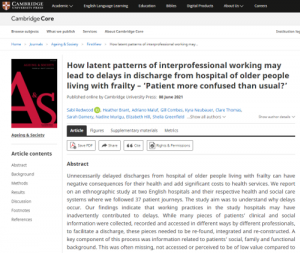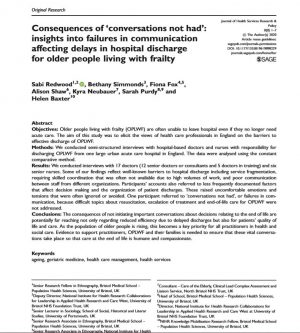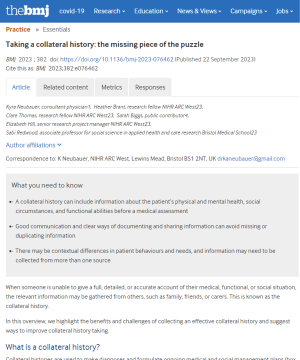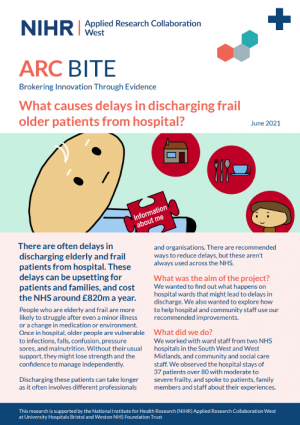Information About Me: Understanding the hidden causes of delays in discharging frail older patients from hospital
There are often delays in discharging elderly and frail patients from hospital. These delays can be upsetting for patients and families, and cost the NHS around £820 million a year.
People who are elderly and frail are more likely to struggle after even a minor illness or a change in medication or environment. Once in hospital, older people are vulnerable to infections, falls, confusion, pressure sores, and malnutrition.
Without their usual support, they might lose strength and the confidence to manage independently.
Discharging these patients can take longer as it often involves several different professionals and organisations. It can be difficult to organise the next stage of care. Social care funding cuts are one cause of delays, but they aren’t the only cause.
There are recommended ways to reduce delays, but these aren’t always used across the NHS. We worked with hospital and community staff in the South West and West Midlands, to understand why this is the case.
Project aims
We wanted to find out what happens on hospital wards that might lead to delays in discharge. We also wanted to explore how to help hospital and community staff use our recommended improvements.
What we did
We worked with ward staff from two large NHS hospitals, and community and social care services staff. We observed the hospital stays of 37 patients over the age of 80 with moderate to severe frailty, and spoke to patients, family members and staff about their experiences.
What we found and what this means
We found that working practices in the hospitals may have inadvertently contributed to delays.
Different types of information about a patient were collected, recorded and accessed in different ways by different professionals. We called this ‘de-constructing’ the patient. For a patient to be discharged, all these pieces of information have to be found and put back together – or ‘re-constructed’. This can take time.
We found that information about a patient’s home life and how they were before their hospital stay was very important during the discharge process. We called this ‘Information About Me’.
What we saw
“They were looking in his written and electronic notes for a list of investigations, results and previous admissions and treatments. This took around 5-10 minutes and were still left with a lot of uncertainty about what had happened both recently and in the past. The junior doctor joked that ‘it was like being a detective trying to find and then piece together all the information’.”
Fieldnotes, Site A
What they said
“If we just deal with the acute problem, you tend to miss the bigger picture, so that’s why we gather all that information and then make a plan which involves early discussions with the relatives … so pulling all of that together and moving forward.”
Consultant geriatrician, Site A
“I used to find it frustrating that I’m not allowed to spend half an hour talking to someone but I am allowed to charge the hospital for an x-ray, blood tests … But as you develop as a doctor, you realise that doesn’t give you as much information as spending half an hour talking to them. So now I spend half an hour talking to them and I order less tests.”
Junior doctor, Site B
“Quite often you are asked for a history…it’s distressing enough as it is…It felt like each time I went to visit Mum, I met a different nurse who wrote things down on a piece of paper in Mum’s file, each time I felt like I was explaining the same thing. It was like Groundhog Day.”
Daughter/carer, Site A
What next?
Our findings have led to the following recommendations:
- Promote the metaphor of patient de-construction and re-construction among professionals to raise awareness of the key role of ‘Information About Me’
- New electronic forms should avoid using standardised questions, to allow the patient’s personal story to be shared between staff in a narrative, rather than using tick boxes
- Work with patient and carer organisations to highlight the key role of ‘Information About Me’ to patients, families and carers
Based on the research findings, we launched a campaign called Information About Me on 16 November 2020.
We created a short animation to raise awareness about what older patients and their family members can do to help patients be discharged from hospital when they are ready.
The animation links to an example of the information about older patients that clinicians need to help them make decisions about their safe and timely discharge from hospital. Download a sample Information About Me form.
We will be working closely with hospitals locally and nationally to introduce the use of Information About Me forms when an older person with frailty is admitted to hospital in an emergency.
As well as the Information About Me campaign, the findings from this study will help improve the process of discharging frail older patients from the participating hospitals. The findings will also provide valuable information for policymakers and healthcare professionals across the UK about how to reduce discharge delays for frail older patients.
Papers

How latent patterns of interprofessional working may lead to delays in discharge from hospital of older people living with frailty – ‘Patient more confused than usual?’
Read the paper
Consequences of ‘conversations not had’: insights into failures in communication affecting delays in hospital discharge for older people living with frailty
Read the paper
Links and downloads
- Discharging older patients: how a single form could help avoid unnecessary hospital delays Read Heather Brant's blog for RCNi
Lead collaborators
- Dr Kyra Neubauer
- Dr Zoe Wyrko
- Professor Sheila Greenfield, NIHR ARC West Midlands
- Dr Gill Combes, NIHR ARC West Midlands
ARC West Staff
Liz Hill
Research Portfolio ManagerDr Clare Thomas
Research FellowPartners on this project
University of Bristol
The University of Bristol is internationally renowned and one of the very best in the UK, due to its outstanding teaching and research, its superb facilities and highly talented students and staff. Its students thrive in a rich academic environment which is informed by world-leading research. It hosts the Elizabeth Blackwell Institute for Health Research.


